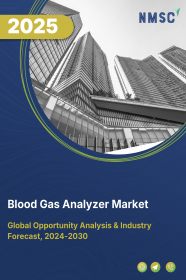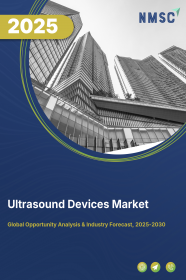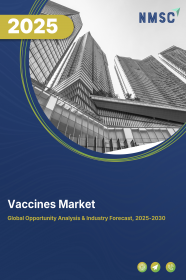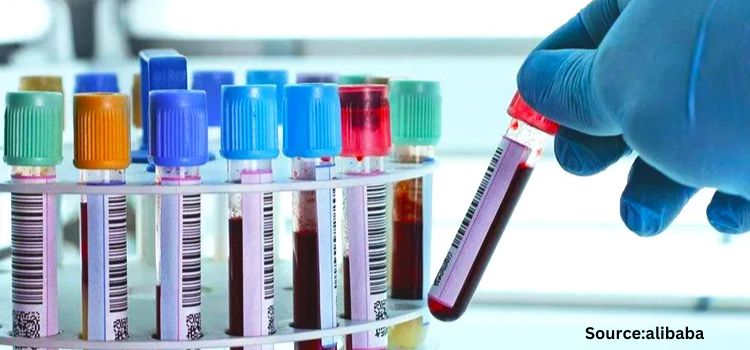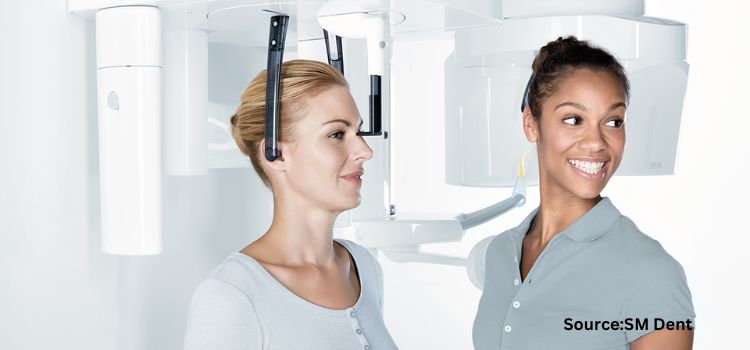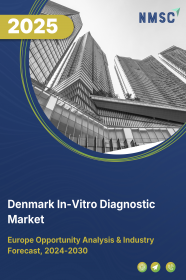
Denmark In-Vitro Diagnostic Market by Type (Reagents, Instruments, and Software & Services), by Technique (Immunodiagnostics, Hematology, Molecular Diagnostics, Tissue Diagnostics, Clinical Chemistry, and Other IVD Techniques), by Application (Infectious Diseases, Cancer, Cardiac Diseases, Immune System Disorders, Nephrological Diseases, Gastrointestinal Diseases, and Others) – Opportunity Analysis and Industry Forecast, 2024–2030
Industry: Healthcare | Publish Date: 15-Feb-2025 | No of Pages: 139 | No. of Tables: 104 | No. of Figures: 69 | Format: PDF | Report Code : HC2349
Denmark In-Vitro Diagnostics Market Overview
The Denmark In-Vitro Diagnostics Market size was valued at USD 555.00 million in 2023, and is predicted to reach USD 840.02 million by 2030, at a CAGR of 5.6% from 2024 to 2030. In-Vitro diagnostics (IVD) refers to a wide range of medical tests conducted on samples of bodily fluids, tissues, or cells outside of the body to diagnose diseases, monitor therapy, and assess overall health conditions. These tests are performed in laboratory settings using various techniques and technologies, including immunoassays, molecular diagnostics, clinical chemistry, hematology, and microbiology.
These tests enable early detection of diseases, allowing for timely intervention and treatment initiation. By providing rapid and accurate results, IVD tests facilitate personalized medicine, guiding tailored treatment approaches based on individual patient characteristics.
Also, in-vitro experiments provide valuable insights into biological systems, enabling scientists and researchers to make significant contributions to fields such as medicine, biotechnology, and pharmacology. They serve as essential tools for understanding fundamental biological processes and developing innovative solutions to address health challenges.
Growing Healthcare Spending in Denmark Drives In-Vitro Diagnostics Market Growth
Increasing healthcare expenditure in Denmark significantly propels the growth of the in-vitro diagnostics market. Each year, the nation allocates approximately 10 percent of its GDP towards healthcare, equating to slightly over USD 7,000 per person. This substantial funding enables the adoption of advanced diagnostic technologies and innovative solutions to address evolving healthcare needs.
Rising Chronic Condition Rates Fuel Demand for In-Vitro Diagnostics in Denmark
The higher incidence of chronic conditions among individuals drives the demand for advanced diagnostic methods such as in-vitro diagnostics. According to National Institutes of Health, in Denmark, an estimated 30–50% of adults experience one or more chronic conditions or long-standing illnesses such as diabetes, arthritis, high blood pressure, epilepsy, asthma, and certain mental health conditions.
Notably, chronic conditions contribute to up to 80% of total healthcare costs of the nation. This underscores the critical role of in-vitro diagnostics technologies in optimizing disease management strategies and improving patient outcomes. As healthcare providers strive to cope with the increasing healthcare demands associated with chronic conditions, the adoption of innovative in-vitro diagnostics technologies become essential for enhancing diagnostic accuracy, and ultimately improving the quality of healthcare delivery in Denmark.
High Research, Development, and Regulatory Approval Costs Hinder Vitro Diagnostics Market Growth
High costs associated with research, development, and regulatory approval are significant factors restraining the in-vitro diagnostics market growth. Operating within this sector necessitates significant financial investment for companies to navigate the complex landscape of research and development.
This investment often encompasses extensive clinical trials, laboratory testing, and product refinement to guarantee accuracy and reliability. Additionally, obtaining regulatory approvals from agencies such as the FDA requires strict adherence to stringent standards, further compounding the financial burden. This financial constraint can discourage potential adopters from market expansion.
Introduction of Point-of-Care Testing Solutions in IVD Creates Opportunity
Point-of-care testing (POCT) is poised to be a significant driver of growth in the in-vitro diagnostics (IVD) market in the forthcoming years. POCT serves as a valuable complement to laboratory testing, especially in situations where immediate results are crucial, such as emergency departments, ambulances, and remote healthcare settings.
With POCT technologies offering rapid tests for infectious diseases, cardiac markers, glucose monitoring, pregnancy testing, and more, healthcare providers can quickly assess patients' conditions and make timely treatment decisions. By integrating POCT with traditional IVD, healthcare providers can enhance their diagnostic capabilities, delivering more efficient and patient-centered care. This integration streamlines workflows, allowing for faster diagnosis and treatment initiation, ultimately leading to improved patient outcomes.
Competitive Landscape
The promising players operating in the Denmark in-vitro diagnostics industry include Roche Holding AG, Abbott Laboratories, Thermo Fisher Scientific Inc, Danaher Corporation, Becton, Dickinson and Company, Siemens Healthineers AG, bioMérieux SA, Sysmex Corporation, QIAGEN N.V., and Bio-Rad Laboratories, Inc., and others.
Denmark In-Vitro Diagnostic Market Key Segments
By Type
-
Reagents
-
Instruments
-
Software & Services
By Technique
-
Immunodiagnostics
-
Enzyme-Linked Immunosorbent Assay (ELISA)
-
Rapid Tests
-
Chemiluminescence Immunoassay (CLIA)
-
Enzyme-linked Immunosorbent spot (ELISpot)
-
Radioimmunoassay (RIA)
-
Western Blot
-
-
Hematology
-
Molecular Diagnostics
-
PCR
-
INAAT
-
Hybridization
-
DNA diagnostics
-
Microarray
-
Other Molecular Diagnostics
-
-
Tissue Diagnostics
-
Clinical Chemistry
-
Basic Metabolic Panel
-
Liver Panel
-
Renal Profile
-
Lipid Profile
-
Thyroid Function Panel
-
Electrolyte Panel
-
Speciality Chemicals
-
-
Other IVD Techniques
By Application
-
Infectious Diseases
-
Cancer
-
Cardiac Diseases
-
Immune System Disorders
-
Nephrological Diseases
-
Gastrointestinal Diseases
-
Others
By End User
-
Stand Alone Laboratory
-
Hospitals
-
Academics and Medical Schools
-
Point of Care Testing
-
Other End Users
REPORT SCOPE AND SEGMENTATION:
|
Parameters |
Details |
|
Market Size Value in 2023 |
USD 555.00 million |
|
Revenue Forecast in 2030 |
USD 840.02 million |
|
Value Growth Rate |
CAGR of 5.6% from 2024 to 2030 |
|
Analysis Period |
2023–2030 |
|
Base Year Considered |
2023 |
|
Forecast Period |
2024–2030 |
|
Market Size Estimation |
Million (USD) |
|
Growth Factors |
|
|
Companies Profiled |
10 |
|
Customization Scope |
Free customization (equivalent up to 80 working hours of analysts) after purchase. Addition or alteration to country, regional, and segment scope. |
|
Pricing and Purchase Options |
Avail customized purchase options to meet your exact research needs. |
KEY PLAYERS
-
Roche Holding AG
-
Abbott Laboratories
-
Thermo Fisher Scientific Inc
-
Danaher Corporation
-
Becton, Dickinson and Company
-
Siemens Healthineers AG
-
bioMérieux SA
-
Sysmex Corporation
-
QIAGEN N.V.
-
Bio-Rad Laboratories, Inc.

















 Speak to Our Analyst
Speak to Our Analyst



